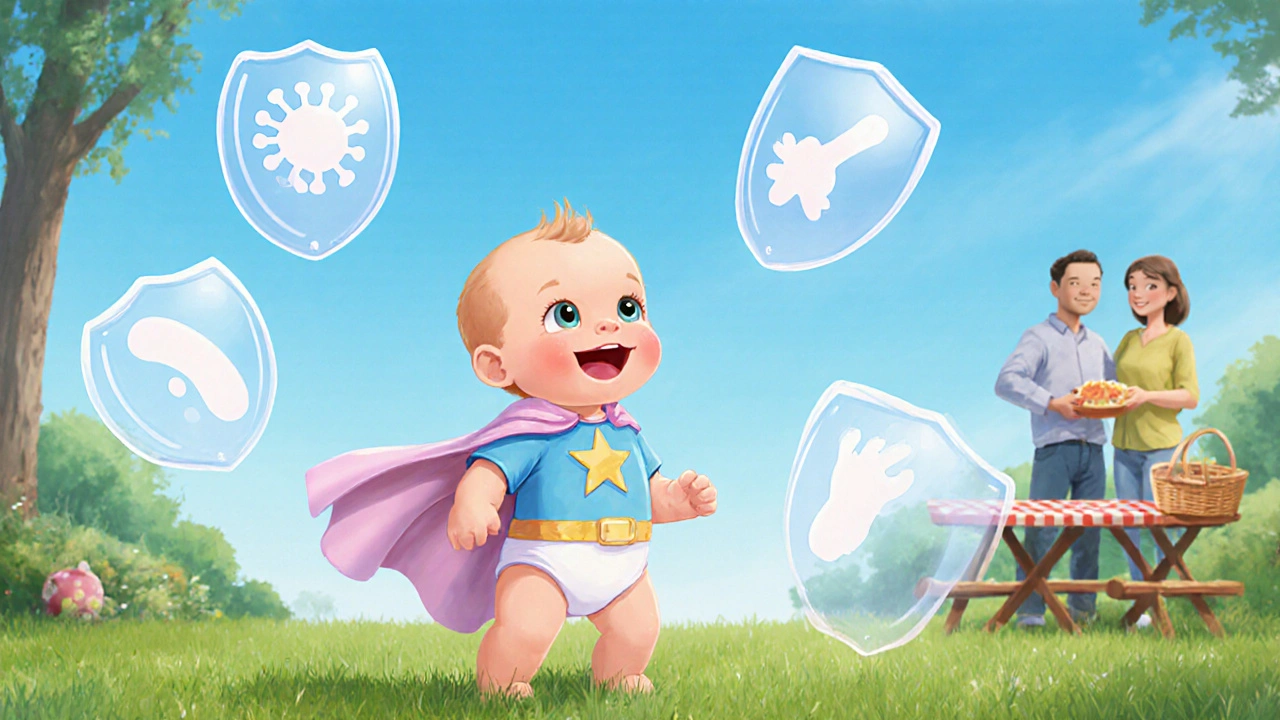Key Takeaways
- Vaccines are the most effective way to prevent serious infections in the first year of life.
- The recommended schedule is timed to build protection when babies are most vulnerable.
- Herd immunity shields infants who are too young to be fully vaccinated.
- Serious side effects are rare; most reactions are mild and short‑lived.
- Staying on schedule requires good record‑keeping and open talks with your pediatrician.
When a newborn arrives, the list of things to buy, clean, and learn can feel endless. Among the top priorities, however, is a word you’ll hear again and again: immunizations. Giving babies the right shots at the right time isn’t just a box‑checking exercise-it’s a lifesaver that protects your child now and the whole community later.
What Are Immunizations?
Immunization is the process of stimulating the body’s immune system to create protection against specific diseases, usually through a vaccine injection. In plain terms, it teaches a baby’s immune cells to recognize and fight off germs without the child having to suffer the illness first.
Vaccine a biological preparation containing weakened or dead parts of a pathogen, or a piece of its genetic material, that triggers immunity is the tool doctors use to deliver immunizations. Though the word “vaccine” sometimes sounds high‑tech, most are simple, sterile liquids that have been rigorously tested for safety.
Why the First Year Is Critical
A newborn’s immune system is still learning. Infant a child in the first 12 months of life, whose immune defenses are developing and rely heavily on maternal antibodies and early vaccinations protection comes from two sources: antibodies passed from the mother during pregnancy and the first set of vaccines administered shortly after birth. As those maternal antibodies fade, the infant becomes more susceptible to infections like measles, pertussis, and polio. Timely immunizations fill that gap.
The Recommended Vaccine Schedule
The schedule isn’t arbitrary; it’s based on decades of research that balances immune response, disease risk, and safety. Below is the standard U.S. timetable, which most health authorities-including the CDC the Centers for Disease Control and Prevention, the U.S. federal agency responsible for public health guidance-recommend.
| Age | Vaccine(s) | Disease(s) Prevented |
|---|---|---|
| Birth | HepatitisB (HepB) | HepatitisB |
| 2months | DTaP, Hib, IPV, PCV13, Rotavirus | Pertussis, Diphtheria, Tetanus, Haemophilus influenzae typeb, Polio, Pneumococcal disease, Rotavirus |
| 4months | DTaP, Hib, IPV, PCV13, Rotavirus (2nd dose) | Same as 2‑month diseases |
| 6months | DTaP, Hib, IPV, PCV13, HepB (3rd dose), Flu (annually starting at 6months) | Same as earlier + Influenza |
| 12months | MMR, Varicella, HepA (optional), Hib (booster), PCV13 (booster) | Measles, Mumps, Rubella, Chickenpox, HepatitisA, Hib, Pneumococcal disease |
Keeping these appointments on track saves your child from diseases that used to claim thousands of lives each year.

Diseases That Vaccines Halt
Each shot fights a specific enemy. Here’s a quick look at the most dangerous foes your infant’s shots target:
- Measles a highly contagious viral illness causing fever, rash, and potentially severe complications like pneumonia or encephalitis
- Polio a viral disease that can paralyze muscles and, in severe cases, disable breathing
- Pertussis whooping cough, a bacterial infection that leads to violent coughing fits and can be fatal for infants
- Hib Haemophilus influenzae typeb, causing meningitis, epiglottitis, and serious pneumonia in young children
- Rotavirus a leading cause of severe diarrhea and dehydration in babies
- Pneumococcal disease bacterial infection that can cause meningitis, bloodstream infections, and pneumonia
Before vaccines existed, these illnesses were common, and many children suffered lasting damage or death. The drop in cases after widespread immunization is one of public health’s biggest success stories.
Herd Immunity: Protecting the Whole Community
Vaccines don’t just shield the child who receives them. When a large portion of the population is immune, the pathogen’s ability to spread drops dramatically. This “herd immunity” effect is crucial for infants who can’t complete their full vaccine series until after their first birthday.
For example, the World Health Organization the United Nations agency that coordinates international health policy and disease‑prevention programs reports that measles outbreaks often erupt in communities where vaccination rates dip below 95%. Those gaps expose newborns, who are still relying on maternal antibodies, to a virus that can be deadly.
By getting your child vaccinated, you’re also doing your part to keep the wider community safe-neighbors, grandparents, and even strangers benefit from the reduced circulation of germs.
Safety First: Addressing Common Concerns
It’s natural for parents to worry. Here are the facts most doctors hear:
- Are vaccines dangerous? Serious side effects occur in less than one in a million doses. Most reactions are mild-soreness at the injection site, low‑grade fever, or brief fussiness.
- Can vaccines cause autism? Multiple large‑scale studies, including those by the CDC, have found no link between vaccines and autism spectrum disorders.
- What about too many shots at once? The infant immune system can handle many antigens simultaneously. Modern vaccines contain far fewer antigens than those used decades ago, yet they still produce robust protection.
- Do I need to keep a record? Yes. Immunization records help pediatricians track which doses are due and serve as proof for schools or travel.
When you discuss any worries with your child's pediatrician, you’ll get personalized answers backed by the latest research.
Practical Steps for Busy Parents
- Schedule early. Book the 2‑month appointment before the baby’s first birthday to avoid last‑minute rushes.
- Keep a vaccine card. Write down the date, vaccine type, and lot number. Some clinics now offer digital records that sync with your phone.
- Set reminders. Use a calendar app or a simple text reminder service offered by many pediatric offices.
- Know the signs of a reaction. Mild fever or redness is normal. Call your doctor if the baby develops a high fever (above 102°F), persistent crying, or swelling that spreads.
- Stay informed. Follow reputable sources like the CDC or the WHO for updates on new vaccines or schedule changes.
Following these steps makes the process smoother and builds confidence that you’re giving your child the best possible start.

Frequently Asked Questions
Can my baby get sick from the vaccine itself?
No. Vaccines contain weakened or dead germs that cannot cause the disease. A small amount of fever or soreness may occur, but the illness you’re protecting against is far more severe.
What if I miss a vaccine appointment?
Contact your pediatrician right away. Most clinics will adjust the schedule to catch up without starting over, as long as the delay isn’t too long.
Do I need separate appointments for each vaccine?
Usually not. Most visits bundle several vaccines into one appointment, which is safe and reduces the number of trips.
How do I know my child’s immunizations are up to date when traveling?
Carry the official vaccine record (paper or digital). Many countries require proof of certain vaccines, such as measles or polio, before entry.
Are there any vaccines I should delay?
Only if your child has a specific medical condition, like a severe allergy to a vaccine component. Your pediatrician will guide you on any necessary adjustments.
Immunizations are a cornerstone of infant health. By staying on schedule, understanding the diseases they prevent, and trusting reputable health authorities, you give your child the strongest shield possible-and help keep the whole community safe.








